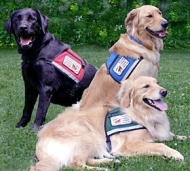Types of Service Dogs
There are many types of service dogs that are trained to help people enhance their quality of life by assisting with a variety of daily tasks that enhance independence. The following are some of the most common categories of trained service dogs.

Mobility Assistance Dogs
Mobility assistance dogs are trained to help people with physical challenges remain as self-sufficient as possible. These service dogs are commonly trained to retrieve objects, push buttons, and open and close doors.
Some mobility assistance dogs wear harnesses and are trained to pull their owners' wheelchairs. Others are referred to as "walker dogs" and help their owners walk with greater stability and balance. The also may serve as a brace to help owners regain their position if they fall.
Hearing Service Dogs
Hearing dogs are specially trained to assist people who are deaf or hard of hearing. For example, hearing dogs are trained to alert their owners to various sounds, like smoke alarms, alarm clocks, doorbells, etc.
Hearing dogs get the attention of their owners, not by barking, but by gently nudging them with their nose or pawing them.
Guide Dogs
Guide dogs, also known as seeing-eye dogs, are among the most common types of service dogs. They work with people who are visually impaired, helping people get around their homes and communities safely.
Serving as "eyes" for their owners, guide dogs are trained to lead their owners around various obstacles, signal changes in elevation, and locate objects on command.
For example, a guide dog may navigate around lamp posts and pot holes, stop or sit to indicate a curb or steps into a building, find an empty seat, find an entrance, or retrieve a dropped object.
Psychiatric Service Dogs
These types of service dogs are trained to assist people who have a wide range of psychiatric disabilities, from post-traumatic stress disorder to panic disorder. Psychiatric service dogs provide medical intervention and support.
Tasks they may perform include reminding their owners to take their medication, signaling repetitive or harmful behaviors, and helping their owners cope with emotional overload by providing them with tactile simulation.
Seizure Response Dogs
Seizure response dogs are trained to summon help, stay with their owners during a seizure, and retrieve a phone prior to a seizure, among other tasks. Seizure response dogs are capable of warning epilepsy sufferers of an oncoming seizure minutes or even hours before it occurs.
Some researchers believe that this is possible because seizure response dogs detect changes in a human's scent or behavior just before an episode occurs.
Autism Service Dogs
Helping to provide more independence and confidence, autism service dogs assist people with autism perform everyday tasks and process sensory information.
Autism service dogs may alert their handlers to important noises, guide them around obstacles, signal them to avoid self-harming behavior, and help them find specific places.
Therapy Dogs
Therapy dogs provide companionship and emotional support, and they are not defined by federal law. People cannot bring therapy dogs into public places with "no pets" policies, as they technically aren't considered service dogs. Nevertheless, they're often grouped into the same category.
For more information on service dogs, click here: about service dogs.
Related Information
Service Dog Training: An Overview
Requirements for Training Aide Dogs
Certification - Is it Necessary?
Tips and Resources for Finding Training Schools
Service Dog Supplies
Back to Mobility Advisor HOME from Types of Service Dogs
Article: Types of Service Dogs
Popular ArticlesTypes of Mobility Chairs Wheelchair Sports Activities Helpful Resource Organizations Mobility Scooter Buying Tips Portable Ramp Options |


